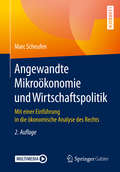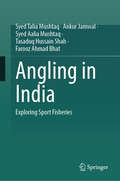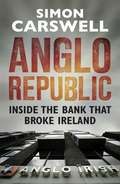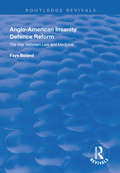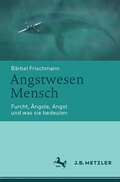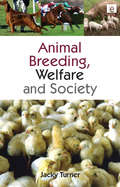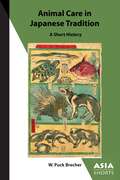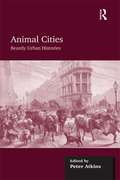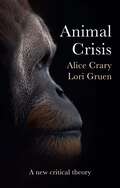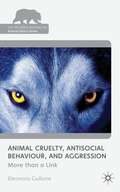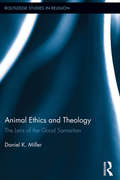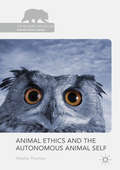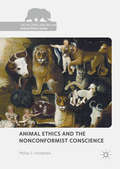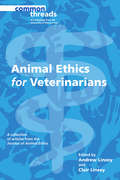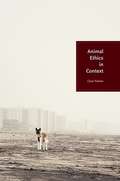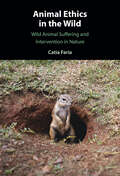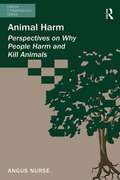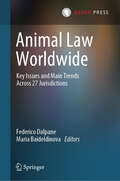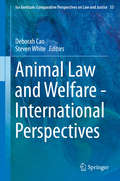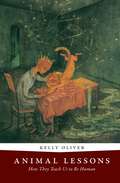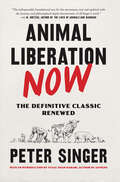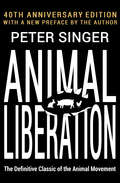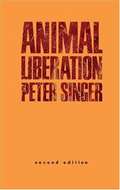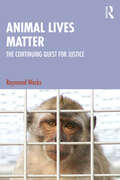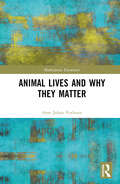- Table View
- List View
Angewandte Mikroökonomie und Wirtschaftspolitik: Mit einer Einführung in die ökonomische Analyse des Rechts
by Marc ScheufenDieses Lehrbuch versteht sich als eine anwendungsorientierte Einführung in die Mikroökonomie. Neben der klassischen Methodenvermittlung stehen vor allem die Anwendung dieser Methoden auf die Wirtschaftspolitik im Allgemeinen und die ökonomische Analyse des Rechts (insbesondere Patent-, Urheber-, Wettbewerbs- und Vertragsrecht) im Besonderen im Mittelpunkt.
Angling in India: Exploring Sport Fisheries
by Ankur Jamwal Syed Talia Mushtaq Syed Aalia Mushtaq Tasaduq Hussain Shah Farooz Ahmad BhatThis book discusses the diverse array of aquatic life of Indian waters, including rivers, lakes, and coastal regions. This book is a useful manual as it explores the historical and cultural background of fishing in the country. It highlights the need of ethical fishing methods and the crucial part fishermen play in protecting the aquatic habitats. This book also covers lesser-known fishing locations and thus promotes a conservation and sustainable tourism mindset. It promotes environmental awareness and care with a focus on highlighting Indian biodiversity. Further, it offers vital details on licenses, rules, and equipment used in angling. Emphasis has been given on responsible angling and the role of anglers in aquatic biodiversity conservation efforts. This book acts as an instruction manual for anyone wishing to discover, comprehend, and safeguard the country's unique sport fisheries. It is also relevant to environmentalists and conservation advocates. Scholars and researchers in the fields of ecology, environmental science, and cultural studies will also benefit from this book for academic purposes and for understanding the cultural and ecological dimensions of angling in India.
Anglo Republic: Inside the bank that broke Ireland
by Simon CarswellAs late as 2007, Anglo Irish Bank was a darling of the markets, internationally recognized as one of the fastest growing financial institutions in the world. By 2008, it was bust. The Irish government's hopeless attempts to save Anglo have led the state to ruin - culminating in a punitive IMF bailout in late 2010 and threatening the future of the euro.Now, for the first time, the full story of the Anglo disaster is being told - by the journalist who has led the way in coverage of the bank and its many secrets. Drawing on his unmatched sources in and around Anglo, Simon Carswell of the Irish Times shows how the business model that brought Anglo twenty years of spectacular growth was also at the heart of its - and Ireland's - downfall. He paints a vivid and disturbing picture of life inside Anglo - the credit committee meetings, the lightning-quick negotiations with property developers, the culture of lavish entertainment for politicians and regulators - and of the men who presided over its dizzying rise and fall: Sean FitzPatrick, David Drumm, Willie McAteer and many others. This is not only the first full account of the Anglo disaster; it will also be the definitive one.
Anglo-American Insanity Defence Reform: The War Between Law and Medicine (Routledge Revivals)
by Faye BolandFirst published in 1999, The book examines the magnitude of the polemic surrounding each attempt to reformulate the insanity defence in the United States, England and Ireland. The book contains a critique of the McNaghten Rules, the defence of irresistible impulse, the product test of insanity, the justly responsible test, the American Law Institute’s test of insanity and the Butler Committee’s proposed revision. At the heart of the controversy surrounding each reformulation has been a medico-legal tension over the wording of the insanity defence and whether law or psychiatry’s view of insanity should prevail. The book looks at the success of the English diminished responsibility defence in abating the controversy. The result of introducing this defence has been the emergence of the legal and medical professions from a state of cold war to entente cordiale. The book explores the reasons for the diminished responsibility defence’s success in resolving the polemic over the insanity defence.
Angstwesen Mensch: Furcht, Ängste, Angst und was sie bedeuten
by Bärbel FrischmannAngst begleitet uns überallhin und jederzeit. Sie gehört zum Menschen. Der Mensch ist ein Angstwesen, und dies prägt sein Verhältnis zur Welt, zu anderen und zu sich selbst. Um die Bedeutung der verschiedenen Ängstigungsweisen zu erläutern, wird eine Unterscheidung von drei Grundfunktionen, affektive Furcht, gefühlte Ängste und geistige Angst, vorgeschlagen. Sie stellen jeweils spezifische Ausprägungen der überlebenswichtigen Gefahrenbewältigung dar, die beim Menschen nicht nur die körperliche Schutzfunktion umfasst, sondern auch durch gedankliche Antizipation möglicher Risiken und Bedrohungen geprägt ist. Aber vor allem die Angstgefühle können aus dem Gleichgewicht geraten, als leidvoll erlebt werden und sogar pathologisch werden. Deshalb soll am Ende auch die Hoffnung formuliert werden, dass Menschen die geistige Kraft besitzen, ihre Ängste sinnvoll in ihr Leben einzuordnen. Für eine differenzierte Sicht auf die Thematik werden zum einen einschlägige Theorien von Biologie über Psychologie bis Soziologie und Philosophie herangezogen, zum anderen die gewonnenen Ergebnisse mit Blick auf gesellschaftliche, politische und ideologisch-weltanschauliche Anwendungsbereiche vertieft.
Animal Breeding, Welfare and Society
by Jacky TurnerThe determination of when, how, how often and with whom an animal breeds is moving rapidly away from evolutionary pressures and towards human purposes: these include the breeding of around 50 billion mammals and birds for food production annually, the breeding of pedigree dogs and cats, racing dogs and horses, specialised laboratory animal strains and the use of reproductive science to conserve endangered species or breeds and to limit unwanted populations of pests and non-native species. But the ethics and sustainability of this takeover of animals' reproductive lives have been insufficiently examined by either professionals or the public. This book discusses the methods, the motivations and the consequences of human intervention in animal breeding in terms of animal health, behaviour and well-being. It explores where we are now and the choices ahead, and looks to a future where we have more respect for animals as sentient beings and where we could loosen the reins of reproductive control.
Animal Care in Japanese Tradition: A Short History
by W. Puck BrecherThis volume provides an historical overview of Japan's relationship with animals from ancient times to the 1950s. Its analysis serves as a lens through which to scrutinize Japanese tradition and interrogate ahistorical claims about Japan’s culturally endemic empathy for the natural world. Departing from existing scholarship on the subject, the book also connects Japan’s much-maligned record of animal exploitation with its strong adherence to contextual, needs-based moral memory.
Animal Cities: Beastly Urban Histories
by Peter AtkinsAnimal Cities builds upon a recent surge of interest about animals in the urban context. Considering animals in urban settings is now a firmly established area of study and this book presents a number of valuable case studies that illustrate some of the perspectives that may be adopted. Having an ’urban history’ flavour, the book follows a fourfold agenda. First, the opening chapters look at working and productive animals that lived and died in nineteenth-century cities such as London, Edinburgh and Paris. The argument here is that their presence yields insights into evolving understandings of the category ’urban’ and what made a good city. Second, there is a consideration of nineteenth-century animal spectacles, which influenced contemporary interpretations of the urban experience. Third, the theme of contested animal spaces in the city is explored further with regard to backyard chickens in suburban Australia. Finally, there is discussion of the problem of the public companion animal and its role in changing attitudes to public space, illustrated with a chapter on dog-walking in Victorian and Edwardian London. Animal Cities makes a significant contribution to animal studies and is of interest to historical geographers, urban, cultural, social and economic historians and historians of policy and planning.
Animal Crisis: A New Critical Theory
by Lori Gruen Alice CraryLeading philosophers Alice Crary and Lori Gruen offer a searing and desperately needed response to systems of thought and action that are failing animals and, ultimately, humans too. In the wake of global pandemics, mass extinctions, habitat destruction, and catastrophic climate change, they issue a clarion call to address the intertwined problems we face, arguing that we must radically reimagine our relationships with other animals. In stark contrast to traditional theories in animal ethics, which abstract from social mechanisms harmful to human beings, Animal Crisis makes the case that there can be no animal liberation without human emancipation. Borrowing from critical theories such as ecofeminism, Crary and Gruen present a critical animal theory for understanding and combating the structural forces that enable the diminishment of so many to the advantage of a few. With seven case studies of complex human-animal relations, they make an urgent plea to dismantle the “human supremacism” that is devastating animal lives and hurtling us toward ecocide.
Animal Cruelty, Antisocial Behaviour and Aggression
by Eleonora GulloneDemonstrating that animal cruelty behaviours are another form of antisocial behaviour, alongside human aggression and violence, and almost without exception are carried out by the same individuals this book offers clear recommendations for future research on animal cruelty and future action aimed at prevention.
Animal Ethics and Theology: The Lens of the Good Samaritan (Routledge Studies in Religion)
by Daniel MillerIn this book, Daniel K. Miller articulates a new vision of human and animal relationships based on the foundational love ethic within Christianity. Framed around Jesus’ parable of the Good Samaritan, Animal Ethics and Theology thoughtfully examines the shortcomings of utilitarian and rights-based approaches to animal ethics. By considering the question of animals within the Christian concept of neighbourly love, Miller provides an alternative narrative for understanding the complex relationships that humans have with other animals. This book addresses significant theological questions such as: Does being created in the image of God present a meaningful distinction between humans and other animals? What does it mean for humans to have dominion (Gen. 1:28) over animals? Is meat eating a moral problem for Christians? In addition to drawing out the significance of Christian theology for field of animal ethics this book also engages environmental and feminist ethics. Miller brings a theological perspective to such questions as: Should care for animals be distinguished from care for the environment, and what role should human emotions play in our ethical dealings with other animals? As the title suggests, this book provides fresh insight into the theological significance of human relationships with other animals.
Animal Ethics and the Autonomous Animal Self (The Palgrave Macmillan Animal Ethics Series)
by Natalie ThomasThis book presents a radical and intuitive argument against the notion that intentional action, agency and autonomy are features belonging only to humans. Using evidence from research into the minds of non-human animals, it explores the ways in which animals can be understood as individuals who are aware of themselves, and the consequent basis of our moral obligations towards them. The first part of this book argues for a conception of agency in animals that admits to degrees among individuals and across species. It explores self-awareness and its various levels of complexity which depend on an animals’ other mental capacities. The author offers an overview of some established theories in animal ethics including those of Peter Singer, Tom Regan, Bernard Rollin and Lori Gruen, and the ways these theories serve to extend moral consideration towards animals based on various capacities that both animals and humans have in common. The book concludes by challenging traditional Kantian notions of rationality and what it means to be an autonomous individual, and discussing the problems that still remain in the study of animal ethics.
Animal Ethics and the Nonconformist Conscience (The Palgrave Macmillan Animal Ethics Series)
by Philip J. SampsonThis book explores the religious language of Nonconformity used in ethical debates about animals. It uncovers a rich stream of innovative discourse from the Puritans of the seventeenth century, through the Clapham Sect and Evangelical Revival, to the nineteenth century debates about vivisection. This discourse contributed to law reform and the foundation of the RSPCA, and continues to flavour the way we talk about animal welfare and animal rights today. Shaped by the "nonconformist conscience", it has been largely overlooked. The more common perception is that Christian “dominion” authorises the human exploitation of animals, while Enlightenment humanism and Darwinian thought are seen as drawing humans and animals together in one "family". This book challenges that perception, and proposes an alternative perspective. Through exploring the shaping of animal advocacy discourses by Biblical themes of creation, fall and restoration, this book reveals the continuing importance of the nonconformist conscience as a source to enrich animal ethics today. It will appeal to the animal studies community, theologians and early modern historians.
Animal Ethics for Veterinarians (Common Threads)
by Andrew Linzey Clair LinzeyVeterinarians serve on the front lines working to prevent animal suffering and abuse. For centuries, their compassion and expertise have improved the quality of life and death for animals in their care. However, modern interest in animal rights has led more and more people to ask questions about the ethical considerations that lie behind common veterinary practices. This Common Threads volume, drawn from articles originally published in the Journal of Animal Ethics (JAE), offers veterinarians and other interested readers a primer on key issues in the field. Essays in the first section discuss aspects of veterinary oaths, how advances in animal cognition science factor into current ethical debates, and the rise of complementary and alternative veterinary medicine and its relationship to traditional veterinary medicine. The second section continues with an essay that addresses why veterinarians have an obligation to educate animal caregivers to look past "cuteness" in order to treat all animals with dignity. The collection closes with three short sections focusing on animals in farming, trade, and research ”areas where veterinarians encounter conflicts between their job and their duty to advocate and care for animals. Contributors: Judith Benz-Schwarzburg, Vanessa Carli Bones, Grace Clement, Simon Coghlan, Priscilla N. Cohn, Mark J. Estren, Elisa Galgut, Eleonora Gullone, Matthew C. Halteman, Andrew Knight, Drew Leder, Andrew Linzey, Clair Linzey, Kay Peggs, Megan Schommer, Clifford Warwick, and James W. Yeates.
Animal Ethics in Context
by Clare PalmerIt is widely agreed that because animals feel pain we should not make them suffer gratuitously. Some ethical theories go even further: because of the capacities that they possess, animals have the right not to be harmed or killed. These views concern what not to do to animals, but we also face questions about when we should, and should not, assist animals that are hungry or distressed. Should we feed a starving stray kitten? And if so, does this commit us, if we are to be consistent, to feeding wild animals during a hard winter? <P><P>In this controversial book, Clare Palmer advances a theory that claims, with respect to assisting animals, that what is owed to one is not necessarily owed to all, even if animals share similar psychological capacities. Context, history, and relation can be critical ethical factors. If animals live independently in the wild, their fate is not any of our moral business. Yet if humans create dependent animals, or destroy their habitats, we may have a responsibility to assist them. Such arguments are familiar in human cases-we think that parents have special obligations to their children, for example, or that some groups owe reparations to others. Palmer develops such relational concerns in the context of wild animals, domesticated animals, and urban scavengers, arguing that different contexts can create different moral relationships.
Animal Ethics in the Wild: Wild Animal Suffering and Intervention in Nature
by Catia FariaAnimals, like humans, suffer and die from natural causes. This is particularly true of animals living in the wild, given their high exposure to, and low capacity to cope with, harmful natural processes. Most wild animals likely have short lives, full of suffering, usually ending in terrible deaths. This book argues that on the assumption that we have reasons to assist others in need, we should intervene in nature to prevent or reduce the harms wild animals suffer, provided that it is feasible and that the expected result is positive overall. It is of the utmost importance that academics from different disciplines as well as animal advocates begin to confront this issue. The more people are concerned with wild animal suffering, the more probable it is that safe and effective solutions to the plight of wild animals will be implemented in the future.
Animal Harm: Perspectives on Why People Harm and Kill Animals (Green Criminology)
by Angus NurseWhy do people harm, injure, torture and kill animals? This book evaluates the reasons why these crimes are committed and outlines the characteristics of the animal offender. It considers ethical and value judgements made about animals and the tacit acknowledgement and justification of unacceptable criminal behaviour towards the harming of animals made by offenders. Situating animal abuse, wildlife crime, illegal wildlife trading and other unlawful activities directed at animals firmly within Green Criminology, the book contends that this is a distinct, multi-dimensional type of criminality which persists despite the introduction of relevant legislation. Taking a broad approach, the book considers the killing and harming of animals in an international context and examines the effectiveness of current legislation, policy and sentencing. Including a section on further reading and useful organizations, this book is a valuable exploration into perspectives on the responsibility owed by man to animals as part of broader ecological and legal concerns. It will interest criminologists, ecologists, animal protectionists and those interested in law and society and law and the environment.
Animal Law Worldwide: Key Issues and Main Trends Across 27 Jurisdictions
by Federico Dalpane Maria BaideldinovaThis book offers a unique panoramic survey of the state of animal law in twenty-six countries and in the legal system of the European Union. The authors give a brief introduction to each jurisdiction, examine key issues, and formulate recommendations. The contributions provide ample opportunities for legal comparative studies touching on constitutional law, criminal law, civil law, environmental law, and administrative law, and discuss the crucial role of NGOs and civil society in raising awareness for the plight of animals. The contributions show the mature stage reached by the discipline of animal law, which is gaining attention in wider circles. The book discusses wildlife, agricultural animals, experimental animals, service animals, stray animals, and others. One of the topics is the constitutionalisation of animal welfare (with a growing number of countries amending their constitutions to include the protection of animals or considering such amendments). Other topics include the trend of moving away from the age-old legal classification of animals as mere things, and the persistent weaknesses in the implementation of legal provisions for the protection of animals. This book will be of keen interest to the worldwide animal law community, legal comparatists, legal theorists, policy makers, judges, law enforcement officials, as well as veterinary doctors. Federico Dalpane is an assistant professor at KIMEP University, College of Social Sciences. Maria Baideldinova is an assistant professor at KIMEP University, School of Law.
Animal Law and Welfare - International Perspectives (Ius Gentium: Comparative Perspectives on Law and Justice #53)
by Deborah Cao Steven WhiteThisbook focuseson animal laws and animal welfare in major jurisdictions in the world,including the more developed legal regimes for animal protection of the US, UK,Australia, the EU and Israel, and the regulatory regimes still developing inChina, South Africa, and Brazil. It offers in-depth analyses and discussions oftopical and important issues in animal laws and animal welfare, and provides acomprehensive and comparative snapshot of some of the most important countriesin the world in terms of animal population and worsening animal cruelty. Amongthe issues discussed are international law topics that relate to animals,including thelatest WTO ruling on seal products and the EU ban, the Blackfish story and USlaw for cetaceans, the wildlife trafficking and crimes related to Africa andChina, and historical and current animal protection laws in the UK andAustralia. Bringing together the disciplines of animal law and animal welfarescience as well as ethics and criminology with contributions from some of the mostprominent animal welfare scientists and animal law scholars in the world, the book considers the strengths and failings ofexisting animal protection law in different parts of the world. In doing so itdraws more attention to animal protection as a moral and legal imperative andto crimes against animals as a serious crime.
Animal Lessons: How They Teach Us to Be Human
by Kelly OliverPhilosophy reads humanity against animality, arguing that "man" is man because he is separate from beast. Deftly challenging this position, Kelly Oliver proves that, in fact, it is the animal that teaches us to be human. Through their sex, their habits, and our perception of their purpose, animals show us how not to be them. This kinship plays out in a number of ways. We sacrifice animals to establish human kinship, but without the animal, the bonds of "brotherhood" fall apart. <P><P>Either kinship with animals is possible or kinship with humans is impossible. Philosophy holds that humans and animals are distinct, but in defending this position, the discipline depends on a discourse that relies on the animal for its very definition of the human. Through these and other examples, Oliver does more than just establish an animal ethics. She transforms ethics by showing how its very origin is dependent upon the animal. Examining for the first time the treatment of the animal in the work of Heidegger, Merleau-Ponty, Derrida, Agamben, Freud, Lacan, and Kristeva, among others, Animal Lessons argues that the animal bites back, thereby reopening the question of the animal for philosophy.
Animal Liberation Now: The Definitive Classic Renewed
by Peter SingerTHE UPDATED CLASSIC OF THE ANIMAL RIGHTS MOVEMENT, NOW WITH AN INTRODUCTION BY YUVAL NOAH HARARI Few books maintain their relevance—and have remained continuously in print—nearly fifty years after they were first published. Animal Liberation, one of TIME’s “All-TIME 100 Best Nonfiction Books” is one such book. Since its original publication in 1975, this groundbreaking work has awakened millions of people to the existence of "speciesism"—our systematic disregard of nonhuman animals—inspiring a worldwide movement to transform our attitudes to animals and eliminate the cruelty we inflict on them. In Animal Liberation Now, Singer exposes the chilling realities of today's "factory farms" and product-testing procedures, destroying the spurious justifications behind them and showing us just how woefully we have been misled. Now, Singer returns to the major arguments and examples and brings us to the current moment. This edition, revised from top to bottom, covers important reforms in the European Union and in various U.S. states, but on the flip side, Singer shows us the impact of the huge expansion of factory farming due to the exploding demand for animal products in China. Further, meat consumption is taking a toll on the environment, and factory farms pose a profound risk for spreading new viruses even worse than COVID-19. Animal Liberation Now includes alternatives to what has become a profound environmental and social as well as moral issue. An important and persuasive appeal to conscience, fairness, decency, and justice, it is essential reading for the supporter and the skeptic alike.
Animal Liberation: The Definitive Classic of the Animal Movement
by Peter SingerThe groundbreaking book that challenged the ethics of our treatment of animals and jump-started the animal rights movement--with a new preface by the author First published in 1975, Animal Liberation created a sensation upon its release, shaking the world's philosophical and animal-protection circles to their cores. Now, forty years later, Peter Singer's landmark work still looms large as a foundational and canonical text of animal advocacy. Arguing that all beings capable of suffering deserve equal consideration, Singer contends that the only justifiable treatment of animals is that which maximizes good and minimizes suffering. In examining the cruelty of factory farming and the exploitation, both commercial and scientific, of laboratory animals, he identifies a kind of "ethical blindness" and calls for political action. A moral wake-up call from one of the most influential and controversial ethicists of our time, Animal Liberation tackles an emotionally charged social issue with a compelling rational argument in a rousing and riveting read. This ebook features an illustrated biography of Peter Singer, including rare photos from the author's personal collection.
Animal Liberation: The Definitive Classic of the Animal Movement (2nd Edition)
by Peter SingerSince its original publication in 1975, this groundbreaking work has awakened millions of people to the existence of "speciesism"--our systematic disregard of nonhuman animals--inspiring a worldwide movement to transform our attitudes to animals and eliminate the cruelty we inflict on them. In Animal Liberation, author Peter Singer exposes the chilling realities of today's "factory farms" and product-testing procedures--destroying the spurious justifications behind them, and offering alternatives to what has become a profound environmental and social as well as moral issue. An important and persuasive appeal to conscience, fairness, decency, and justice, it is essential reading for the supporter and the skeptic alike.
Animal Lives Matter: The Continuing Quest for Justice
by Raymond WacksAnimal Lives Matter provides a comprehensive analysis of the legal, philosophical, and ethical aspects of animal rights. It argues that the subject extends beyond the matter of our obligations towards animals, to include our wider responsibilities for protecting the environment. Drawing on numerous moral, political, legal, religious, and philosophical theories including utilitarianism, deontology, rights theory, social contractarianism, and the capabilities approach, the author meticulously examines the questions of sentience, speciesism, personhood, and human exceptionalism. Lucid, nuanced, and academically rigorous, this important book will be an essential resource for scholars of law, politics, philosophy, ethics, as well as policy makers and the general reader.
Animal Lives and Why They Matter (Multispecies Encounters)
by Arne Johan VetlesenThis book engages with the changing ways in which we, as a society and culture, look upon and interact with animals, stressing how much animals differ among themselves. An invitation to appreciate the peculiar role of animals in telling important if uncomfortable truths about who we are and where we are heading – namely, towards a world so much poorer in cultural, moral, and biological diversity – as a result of the ongoing decimation of so many other species. Drawing on a variety of thought ranging from that of Midgley, Plumwood, and Murdoch to Levinas, Derrida, and Habermas, from ecophilosophers to conservation biologists, Animal Lives and Why They Matter asks how we have come to this, and what an alternative, less destructive approach to our now precarious coexistence with animals might look like. Spanning the disciplines of philosophy, psychology, and anthropology, this enquiry into various cross-species relationships and encounters will appeal to scholars and students across the humanities and social sciences with interests in philosophy, ethics, human-animal interaction, and environmental thought.
